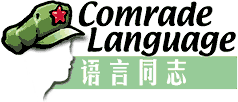|
You foreigners, like us Chinese, spend a lot of time
in the xishoujian--Ď´ĘÖĽä (bathroom), so it's important
to be armed with the proper cesuo--˛ŢËů (toilet) vocabulary
while you're here in a country with 5000 years of squatting
history behind them. Many a weida--ΰ´ó (brilliant)
theory has been formulated in the most modest of commodes.
Some people argue that Rodin's Thinker (ËĽżĽŐß--sikaozhe)
is doing his contemplating from atop a matong--ÂíÍ°
(toilet bowl). And rumor has it that China's sida faming--ËÄ´ó·˘Ă÷
(Four Great Inventions) were conceived in similar circumstances.
Personally, I'm usually paying too much attention to
the pain in my Achilles' tendons and trying not to tip
over while dunzhe--¶××Ĺ (squatting) to come up with
the key to the universe.
Hotels and foreign housing have modern, Western-style
bathrooms, as do many newly renovated Chinese homes,
although Chinese bathrooms (like toilet seats) are small
by Western standards. Foreign student dormitory bathrooms
have improved a lot in recent years, and many even have
sit-down toilets. If you've ever used a gonggong cesuo--ą«ą˛˛ŢËů
(public toilet) in China then you know what it means
to chiku--łÔżŕ (literally "eat bitterÓ or in this case
"smell...Ó). I don't know which is worse, public bathrooms
or miandi--ĂćµÄ taxis! They're both chou--łô (putrid),
but at least in a public toilet you won't get sodomizedÉ
by a metal spring. Besides, public toilets are easier
to find than miandis. Just follow the stench until you
feel like you're going to ™utť--Ż͠(vomit) and you're
there! And, unlike a miandi, before you go into a public
toilet you know how much you'll have to pay.
If you live in Chinese housing and you still
haven't learned the word shuigong--Ë®ą¤ (plumber), you
will. That's who you'll have to call when your drain
is stopped up (loushuikou saizhule--©ˮżÚČűסÁË) or
when something goes wrong with your shuilongtou--Ë®ÁúÍ·
(faucet), shuifa--Ë®·§ (valve) or shuiguan--Ë®ąÜ (pipes).
If you're one of those fix-it-yourself types, you'd
better find out where your local wujindian--Îĺ˝đµę (hardware
store) is. Kitchens and bathrooms in Chinese housing
are usually the biggest headache for foreigners. Besides
old, corroded pipes, few have yugang--Ôˇ¸× (bathtubs),
and the shuiya--Ë® water pressure) tends to be low.
Most Chinese housing is equipped with a reshuiqi--ČČË®Ć÷
(water heater) which, like youyugan--öĎÓă¸É (dried octopus
tentacles), can be bought in any department store and
ensures that you can take a hot shower whenever your
heart desires (the water heater, not the octopus tentacles).
The major drawback of water heaters is that they usually
only offer two temperatures: bingleng--±ůŔä (freezing
cold) and tang--ĚĚ (scalding hot).
If you visit a Chinese family at home, there
are a few things you should know before you use the
bathroom. With water bills on the rise, most Chinese
families only flush the toilet when absolutely necessary.
Of course, "absolutely necessaryÓ means different things
to different people. This custom may seem pretty maodun--ì¶Ü
(contradictory), being that the average xizao--Ď´Ôč
(bathing) time in China is about an hour. If you're
planning on taking a shower in your Chinese friend's
apartment, don't expect there to be any big towels.
There'll probably be an assortment of soggy handcloths,
one for your head and each limb. And finally, remember
that most toilet paper gets thrown into the wire garbage
can, not in the toilet. This may seem less than hygienic,
but is necessary to prevent clogging your host's old
clogged pipes and flooding his apartment.
There are a host of everyday objects found
in Chinese home bathrooms. These include xiangzao--ĎăÔí
(soap), hufasu--»¤·˘ËŘ (conditioner), weisheng/juanzhi--ÎŔÉúÖ˝/ľíÖ˝
(toilet paper) and zazhi--ÔÓÖľ (magazines). Like Australians,
the Chinese don't use deodorant, but they still have
a word for it: fanghanye--·ŔşąŇş (there's also a Chinese
word for napkin--canjinzhi--˛Í˝íÖ˝ though you'll have
a tough time finding them here!). Shampoo, or xifajing--Ď´·˘ľ«,
is also known by its trendy English transliteration
xiangbo--Ď㲨. Small towels (the kind everyone steals
from hotels) are called maojin--Ă«˝í. Big towels (the
kind you can only get in China by stealing them from
hotels) are called yujin--Ôˇ˝í.
The Chinese word for toothbrush, yashua----Ŕˢ,
is one of those "reversibleÓ words. Shuaya-ˢ--Ŕ means
to brush one's teeth. Another reversible word is xihuan--ϲ»¶
(to like) and huanxi-»¶Ď˛ (joyful or delighted). When
I was a kid, we didn't have toothbrushes and fancy foreign
yagao--ŕ (toothpaste). We had to make do with chewing
on steel wool and rinsing with tea leaves (until the
Great Leap Forward when even Brillo pads were melted
down in backyard furnaces) . Now store shelves are chock-a-block
with Crest (jiajieshi--˝ŕĘż), Close-Up (haoqing--đ©Çĺ)
and Colgate (gaolujie--¸ß¶˝ŕ) to choose from.
The most liuxing--Á÷ĐĐ (popular) on-the-John
activity has got to be xiyan--Îü--Ě (smoking cigarettes).
Other favorite ways to pass the time while on the John
in China include keguazir--żÄąĎ×Ó (eating melon seeds),
kanbaozhi-ż´±¨Ö˝ (reading the newspaper) and zhimaoyi--ÖŻĂ«ÓÂ
(knitting sweaters)É pretty much the same things you
would do if you were at work! On the other side of that
coin, favorite ways to pass the time while at work include
going to the bathroom.
Chinese women and Western women have at least
one thing in common: they both love to go to the bathroom
in pairs. But the similarities pretty much stop there.
When asking to be excused in China, don't forget that
there are polite ways of putting things and not-so-polite
ways of putting things. "Wo yao yong xishoujian--ÎÒÒªÓĂĎ´ĘÖĽäÓ
("I want to use the washroomÓ) sounds a lot nicer than
"wo dei saniao--ÎÒµĂČöÄňÓ ("I have to take
a leakÓ). Another polite expression is "wo qu fangbian
yixia--ÎÒČĄ·˝±ăÓ»ĎÂÓ ("I'm going to convenience
myselfÓ). Of course, that could be misinterpreted in
English! "Wo qu fu shuifei--ÎÒÈ¥¸¶Ë®·ÑÓ
or "I'm going to pay the water billÓ is not recommended
during contract negotiations. Take care and biewangle
chongmatong--±đÍüÁËłĺÂíÍ°! (Don't forget to flush!)
|


